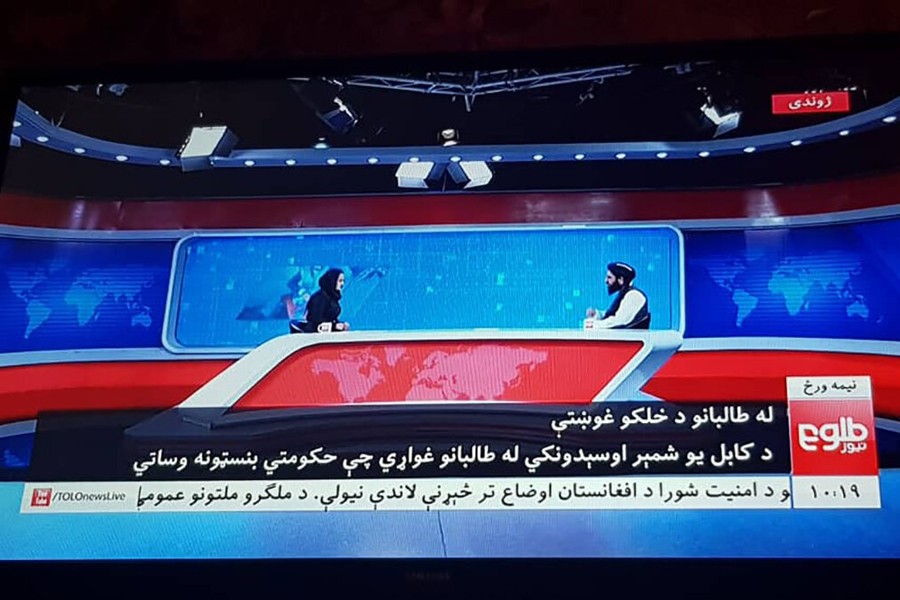On Tuesday an unprecedented discussion took place on an Afghanistan television channel: a female presenter interviewed a Taliban spokesperson about the group’s plans for the country, days after insurgents seized control of the capital, Kabul, The Guardian reports.
It writes, Beheshta Arghand’s discussion with the spokesperson Mawlawi Abdulhaq Hemad is being claimed by the rolling news channel TOLO News as the first time an Afghan woman has conducted an interview with a senior Taliban official inside the country’s borders.
"We said to them, look, a female is going to interview you,” Saad Mohseni, the founder of TOLO News, was quoted to have said. “And they said fine. They could have easily have said screw you – they run the country, they can do whatever they want.”
Reportedly, TOLO News briefly sent its female reporters home on Sunday owing to fears for their safety. But two days later many have returned to work and are out reporting on the streets. At the moment it is “business as a usual” for the outlet, which operates a slick 24-hour television channel and an online presence that has consistently beaten western outlets to obtain footage showing the collapse of the previous regime, according to the British newspaper.
Mohseni was said to have suggested the Taliban were going out of their way to placate watching western governments and media outlets. “It’s important for them to win hearts and minds, and show the internationals that they’re legitimate and that they’re folks you can work with. In this phase the media will have a great deal more freedom than in the latter phases.”
The Guardian mentions that Mohseni, a Dubai-based Afghan-Australian citizen, has spent two decades building up a media empire that includes everything from TOLO News to popular entertainment channels and an Afghan equivalent of Netflix. Although his company has taken the precaution of removing entertainment shows featuring “female singers showing lots of flesh”, it is still broadcasting soap operas and Turkish period dramas to millions of people.
Despite this, the newspaper says, his expectation is the Taliban will ultimately introduce tough broadcast restrictions for journalists who ask tough questions of the new administration: “They’re going to be in government for a while. What happens if you start criticising? You can air anything you want as long as it doesn’t criticise the government?”
However, things have changed a lot since the Taliban were last running Afghanistan in 2001. Back then, television and the internet were banned because of their potential to spread immoral material. Recorded music was illegal, there was a single religious radio station, and there was no commercial mobile phone network, the newspaper points out.
Twenty years later, it adds, the country is awash with smartphones used to record footage that instantly spreads around the country and the world, with 4G connections available in major cities. There are dozens of independent television and radio channels. Around half of Afghanistan’s population are under 20, meaning they were not yet born when the US-backed invasion took place and they have grown up on social media. Many of the Taliban’s fighters are used to spending their time exchanging material on WhatsApp.
This has forced the Taliban into a new approach to the media, The Guardian argues. When fighters gained access to Kabul’s presidential palace on Sunday night, they were accompanied by a film crew from the Qatari-backed television news channel Al Jazeera, who livestreamed their exploration of the deserted building. In recent days Taliban spokespeople have also been interviewed live by female presenters on BBC News and Sky News.
As for TOLO News, Mohseni was quoted to have said the long-term future is bleak for his company and its journalists. “This is an existential threat to us. We’re assuming that we’ve lost the business. Anything better than complete shutdown is a win for us. But we knew the rules of the game before we got into it. This is Afghanistan, it’s a tough neighbourhood.”


